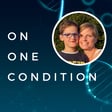
Episode 73: Carolyn McNamara - Acromegaly
Acromegaly is a rare condition caused by a pituitary tumour that leads to excess growth hormone. In this episode, Carolyn shares candidly how her symptoms, which developed slowly and over a long period of time, were mistaken for menopause or normal aging, until a series of unusual infections led to her diagnosis.
She reflects on the shock of being told she had a brain tumour, the challenges of undergoing major surgery, and the ongoing reality of living with residual tumour and long-term treatment. We also talk about the importance of listening to your body, and the progressive journey to recovery and feeling your own self again. Carolyn’s story is one of resilience and hope: she has run marathons, completed triathlons, and learned to manage her energy carefully while still embracing life fully.
The song that Carolyn chose is Unwritten by Natasha Bedingfield.



















